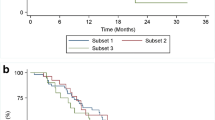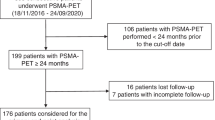Abstract
Objectives
The primary objective is to assess the efficacy of 68Ga-PSMA-11-PET/CT to detect recurrent location(s) in hormone-sensitive prostate cancer (PCa). Secondary objectives are (1) to evaluate changes in clinical management; (2) to determine which covariates independently predict positive scan; (3) to assess 68Ga-PSMA-11-PET/CT performance in different settings of PSA relapse.
Materials and methods
Inclusion criteria include (1) histologically diagnosed PCa; (2) previous radical therapy; (3) proven biochemical recurrence (BCR) or biochemical persistence (BCP); (4) hormone-sensitive PCa (HSPC); (5) androgen deprivation therapy (ADT)–free for at least 6 months; (6) PSA < 1.5 ng/mL or any PSA in case of negative choline-PET/CT (n = 38). Changes in clinical management were defined by multidisciplinary tumour-board. Clinical settings were BCP (group-1, n = 25); first-time BCR (group-2, n = 121); BCR after salvage therapy (group-3, n = 77).
Results
Two hundred twenty-three (223) consecutive patients were enrolled: median PSA = 0.65 ng/mL (0.2–8.9) and median PSAdt = 9.3 months (0.4–144.6). 96.9% received RP as primary therapy. 68Ga-PSMA-11-PET/CT positivity rate was 39.9% (CI95% 33.5–46.7%). Disease confined to pelvis was detected in 23.3% of cases. At least one distant lesion was observed in 16.6% of cases. Secondary objectives are as follows: (1) changes in clinical management were observed in 34.5% of patients; (2) PSA, PSAdt and T stage > 3a were independent predictors (all p < 0.03); (3) 68Ga-PSMA-11-PET/CT positivity rate was 56% (in group 1, 36.3% in group 2, 40.3% in group 3.
Conclusion
This study attested the overall good performance of 68Ga-PSMA-11-PET/CT to detect PCa locations in HSPC patients eligible for salvage therapy, influencing the therapy management in 35.4% of cases. Furthermore, patient characteristics are influencing factors of 68Ga-PSMA-11-PET/CT positivity rate and should be considered to reduce false negative scan.




Similar content being viewed by others
References
Cornford P, Bellmunt J, Bolla M, Briers E, De Santis M, Gross T, et al. EAU-ESTRO-SIOG guidelines on prostate cancer. Part II: treatment of relapsing, metastatic, and castration-resistant prostate cancer. Eur Urol. 2017;71(4):630–42.
Ost P, Bossi A, Decaestecker K, De Meerleer G, Giannarini G, Karnes RJ, et al. Metastasis-directed therapy of regional and distant recurrences after curative treatment of prostate cancer: a systematic review of the literature. Eur Urol. 2015;67(5):852–63.
Stephenson AJ, Scardino PT, Kattan MW, Pisansky TM, Slawin KM, Klein EA, et al. Predicting the outcome of salvage radiation therapy for recurrent prostate cancer after radical prostatectomy. J Clin Oncol. 2007;25(15):2035–41.
Fossati N, Karnes RJ, Colicchia M, Boorjian SA, Bossi A, Seisen T, et al. Impact of early salvage radiation therapy in patients with persistently elevated or rising prostate-specific antigen after radical prostatectomy. Eur Urol. 2017. https://doi.org/10.1016/j.eururo.2017.07.026.
Ost P, Reynders D, Decaestecker K, Fonteyne V, Lumen N, De Bruycker A, et al. Surveillance or metastasis-directed therapy for oligometastatic prostate cancer recurrence: a prospective, randomized, multicenter phase II trial. J Clin Oncol. 2018;36(5):446–53.
Ploussard G, Gandaglia G, Borgmann H, de Visschere P, Heidegger I, Kretschmer A, et al. EAU-YAU Prostate Cancer Working Group. Salvage lymph node dissection for nodal recurrent prostate cancer: a systematic review. Eur Urol. 2018. https://doi.org/10.1016/j.eururo.2018.10.041.
Farolfi A, Ceci F, Castellucci P, Graziani T, Siepe G, Lambertini A, et al. (68)Ga-PSMA-11 PET/CT in prostate cancer patients with biochemical recurrence after radical prostatectomy and PSA <0.5 ng/ml. Efficacy and impact on treatment strategy. Eur J Nucl Med Mol Imaging. 2019;46(1):11–9.
Calais J, Czernin J, Cao M, Kishan AU, Hegde JV, Shaverdian N, et al. (68)Ga-PSMA-11 PET/CT mapping of prostate cancer biochemical recurrence after radical prostatectomy in 270 patients with a PSA level of less than 1.0 ng/mL: impact on salvage radiotherapy planning. J Nucl Med. 2018;59(2):230–7.
Afshar-Oromieh A, Holland-Letz T, Giesel FL, et al. Diagnostic performance of 68Ga-PSMA-11 (HBED-CC) PET/CT in patients with recurrent prostate cancer: evaluation in 1007 patients [published correction appears in Eur J Nucl Med Mol Imaging. 2017 Sep;44(10 ):1781]. Eur J Nucl Med Mol Imaging. 2017;44(8):1258–68.
Calais J, Fendler WP, Herrmann K, Eiber M, Ceci F. Comparison of (68)Ga-PSMA-11 and (18)F-fluciclovine PET/CT in a case series of 10 patients with prostate cancer recurrence. J Nucl Med. 2018;59(5):789–94.
Calais J, Ceci F, Eiber M, Hope TA, Hofman MS, Rischpler C, et al. (18)F-fluciclovine PET-CT and (68)Ga-PSMA-11 PET-CT in patients with early biochemical recurrence after prostatectomy: a prospective, single-centre, single-arm, comparative imaging trial. Lancet Oncol. 2019. https://doi.org/10.1016/S1470-2045(19)30415-2.
Perera M, Papa N, Roberts M, et al. Gallium-68 prostate-specific membrane antigen positron emission tomography in advanced prostate cancer-updated diagnostic utility, sensitivity, specificity, and distribution of prostate-specific membrane antigen-avid lesions: a systematic review and meta-analysis. Eur Urol. 2020; 77(4):403–17.
Ceci F, Castellucci P, Graziani T, Farolfi A, Fonti C, Lodi F, et al. (68)Ga-PSMA-11 PET/CT in recurrent prostate cancer: efficacy in different clinical stages of PSA failure after radical therapy. Eur J Nucl Med Mol Imaging. 2019;46(1):31–9.
Ceci F, Bianchi L, Borghesi M, Polverari G, Farolfi A, Briganti A, et al. Prediction nomogram for 68Ga-PSMA-11 PET/CT in different clinical settings of PSA failure after radical treatment for prostate cancer. Eur J Nucl Med Mol Imaging. 2019. https://doi.org/10.1007/s00259-019-04505-2.
Eiber M, Herrmann K, Calais J, Hadaschik B, Giesel FL, Hartenbach M, et al. Prostate cancer molecular imaging standardized evaluation (PROMISE): proposed miTNM classification for the interpretation of PSMA-ligand PET/CT. J Nucl Med. 2018;59(3):469–78.
Khan MA, Carter HB, Epstein JI, et al. Can prostate specific antigen derivatives and pathological parameters predict significant change in expectant management criteria for prostate cancer? J Urol. 2003;170:2274–8.
Eder M, Neels O, Müller M, Bauder-Wüst U, Remde Y, Schäfer M, et al. Novel preclinical and radiopharmaceutical aspects of [68Ga]Ga-PSMA-HBED-CC: a new PET tracer for imaging of prostate Cancer. Pharmaceuticals (Basel). 2014;7(7):779–96.
Fendler WP, Eiber M, Beheshti M, et al. (68)Ga-PSMA PET/CT: joint EANM and SNMMI procedure guideline for prostate cancer imaging: version 1.0. Eur J Nucl Med Mol Imaging. 2017;44(6):1014–24.
Fanti S, Minozzi S, Morigi JJ, et al. Development of standardized image interpretation for 68Ga-PSMA PET/CT to detect prostate cancer recurrent lesions. Eur J Nucl Med Mol Imaging. 2017;44(10):1622–35.
Caroli P, Sandler I, Matteucci F, et al. 68Ga-PSMA PET/CT in patients with recurrent prostate cancer after radical treatment: prospective results in 314 patients. Eur J Nucl Med Mol Imaging. 2018;45(12):2035–44.
Rauscher I, Duwel C, Haller B, Rischpler C, Heck MM, Gschwend JE, et al. Efficacy, predictive factors, and prediction nomograms for (68)Ga-labeled prostate-specific membrane antigen-ligand positron-emission tomography/computed tomography in early biochemical recurrent prostate cancer after radical prostatectomy. Eur Urol. 2018;73(5):656–61.
Bianchi L, Nini A, Bianchi M, Gandaglia G, Fossati N, Suardi N, et al. The role of prostate-specific antigen persistence after radical prostatectomy for the prediction of clinical progression and cancer-specific mortality in node-positive prostate cancer patients. Eur Urol. 2016;69(6):1142–8.
Ceci F, Herrmann K, Hadaschik B, Castellucci P, Fanti S. Therapy assessment in prostate cancer using choline and PSMA PET/CT. Eur J Nucl Med Mol Imaging. 2017;44(Suppl 1):78–83.
Bianchi L, Borghesi M, Schiavina R, et al. Predictive accuracy and clinical benefit of a nomogram aimed to predict 68Ga-PSMA PET/CT positivity in patients with prostate cancer recurrence and PSA < 1 ng/ml external validation on a single institution database [published online ahead of print, 2020 Jan 31]. Eur J Nucl Med Mol Imaging. 2020. https://doi.org/10.1007/s00259-020-04696-z.
Pereira Mestre R, Treglia G, Ferrari M, Pascale M, Mazzara C, et al. Correlation between PSA kinetics and PSMA-PET in prostate cancer restaging: a meta-analysis. Eur J Clin Investig. 2019 Mar;49(3):e13063.
Calais J, Fendler WP, Eiber M, Gartmann J, Chu FI, et al. Impact of (68)Ga-PSMA-11 PET/CT on the management of prostate cancer patients with biochemical recurrence. J Nucl Med. 2018;59(3):434–41.
Fendler WP, Calais J, Eiber M, Flavell RR, Mishoe A, et al. Assessment of 68Ga-PSMA-11 PET accuracy in localizing recurrent prostate cancer: a prospective single-arm clinical trial. JAMA Oncol. 2019;5(6):856–63.
Farolfi A, Gafita A, Calais J, Eiber M, Afshar-Oromieh A, Spohn F, et al. (68)Ga-PSMA-11 PET detects residual prostate cancer after prostatectomy in a multicenter retrospective study. J Urol. 2019:101097JU0000000000000417. https://doi.org/10.1097/JU.0000000000000417.
Bluemel C, Krebs M, Polat B, Linke F, Eiber M, Samnick S, et al. 68Ga-PSMA-PET/CT in patients with biochemical prostate cancer recurrence and negative 18F-choline-PET/CT. Clin Nucl Med. 2016 Jul;41(7):515–21.
Afshar-Oromieh A, Zechmann CM, Malcher A, et al. Comparison of PET imaging with a (68)Ga-labelled PSMA ligand and (18)F-choline-based PET/CT for the diagnosis of recurrent prostate cancer. Eur J Nucl Med Mol Imaging. 2014;41(1):11–20.
Schwenck J, Rempp H, Reischl G, et al. Comparison of 68Ga-labelled PSMA-11 and 11C-choline in the detection of prostate cancer metastases by PET/CT. Eur J Nucl Med Mol Imaging. 2017;44(1):92–101.
Calais J, Czernin J, Fendler WP, Elashoff D, Nickols NG. Randomized prospective phase III trial of (68)Ga-PSMA-11 PET/CT molecular imaging for prostate cancer salvage radiotherapy planning [PSMA-SRT]. BMC Cancer. 2019;19(1):18.
Author information
Authors and Affiliations
Corresponding author
Ethics declarations
Conflict of interest
The authors declare that they have no conflict of interest.
Ethical approval
All procedures performed in studies involving human participants were in accordance with the ethical standards of the institutional and/or national research committee and with the principles of the 1964 Declaration of Helsinki and its later amendments or comparable ethical standards.
Informed consent and local ethical committee approval
Informed consent form (ICF) was obtained from all individual participants enrolled in this prospective study. This study was approved by the local ethical committee (IRB number: P-5315).
Additional information
Publisher’s note
Springer Nature remains neutral with regard to jurisdictional claims in published maps and institutional affiliations.
This article is part of the Topical Collection on Oncology - Genitourinary.
Electronic supplementary material
ESM 1
(DOCX 16.2 kb)
Rights and permissions
About this article
Cite this article
Deandreis, D., Guarneri, A., Ceci, F. et al. 68Ga-PSMA-11 PET/CT in recurrent hormone-sensitive prostate cancer (HSPC): a prospective single-centre study in patients eligible for salvage therapy. Eur J Nucl Med Mol Imaging 47, 2804–2815 (2020). https://doi.org/10.1007/s00259-020-04809-8
Received:
Accepted:
Published:
Issue Date:
DOI: https://doi.org/10.1007/s00259-020-04809-8




